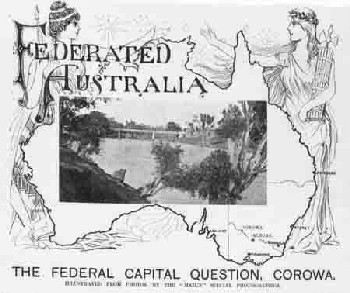
ESSAY INTRODUCTION
There are strong parallels between the life of John Curtin - Australia's great wartime leader - and the Australian nation. Curtin was born at Creswick, Victoria, in 1885 at a time when ideas of Federalism were beginning to be discussed in the eastern colonies. His childhood and youth in the 1890s were counterpointed by the various Federal conventions that ultimately led to Federation.
The fact of Federation impacted on Curtin's thinking regarding the nature and responsibilities of nationhood and his political development from youth to the end of his life, from Socialist orator to Prime Minister of Australia, where Curtin's influence on the shaping of Australia was most clearly exemplified by his push to have the Statute of Westminster finally ratified in order to declare Australia a self-governing Dominion of the British Empire and a fully independent state, free from any British control.

Federal Capital Question, Corowa, NSW, 1899.
By permission of the National Library of Australia
As Australia began its life as a federated nation, Curtin found steady employment; he developed his ideological framework, becoming involved in politics as the Australian Labor Party (ALP) claimed its place as a major political party and alternative holder of government. He suffered deep depression, yet reached heights of inspiration during the terrible days of World War I, he prospered in his chosen career during the optimistic 1920s, was in political eclipse during the Depression, and emerged as a national leader at Australia's time of greatest peril. According to Gough Whitlam, Curtin (in declaring war against Japan) was responsible for the real birth of the Australian nation at the end of 1941. As the nation mourned its war dead, it also mourned its Prime Minister, who died in office on 5 July 1945.
Although Curtin matured and altered with changing circumstances, the beliefs that he held from his early life to his death remained essentially the same. Despite showing some of the racial and gender biases of his time, Curtin espoused the equality of all men and women. He consistently deplored inequality and oppression, and felt compelled to bring about social and political changes to improve the living and working conditions of the poor and empower the powerless. He expressed confidence in the labour movement as the engine of social change, a revulsion against war and violence, and a certainty that Australia should stand on its own feet as a sovereign nation free from the ties and obligations of empire. In government, the practical outcomes of these beliefs resulted in the implementation of social welfare legislation; an insistence upon Australia's right to determine when and where its defence forces would be deployed, and planning for post-war reconstruction in the 1940s to avoid the horrors of the Depression. The fact of Federation gave Curtin a stage upon which to design the government and the nation of his vision. The changes that he advocated remained much the same; the methods changed over time. But the prevailing themes of his life were rooted in, and remained, expressions of radical thought, which he first encountered at an early age. Let's commence by examining some of the ideas and motivations that achieved Federation, and then discuss the extent that Curtin's writings and speeches reflect Federation influences, and trace the process and development of his ideology throughout his life.